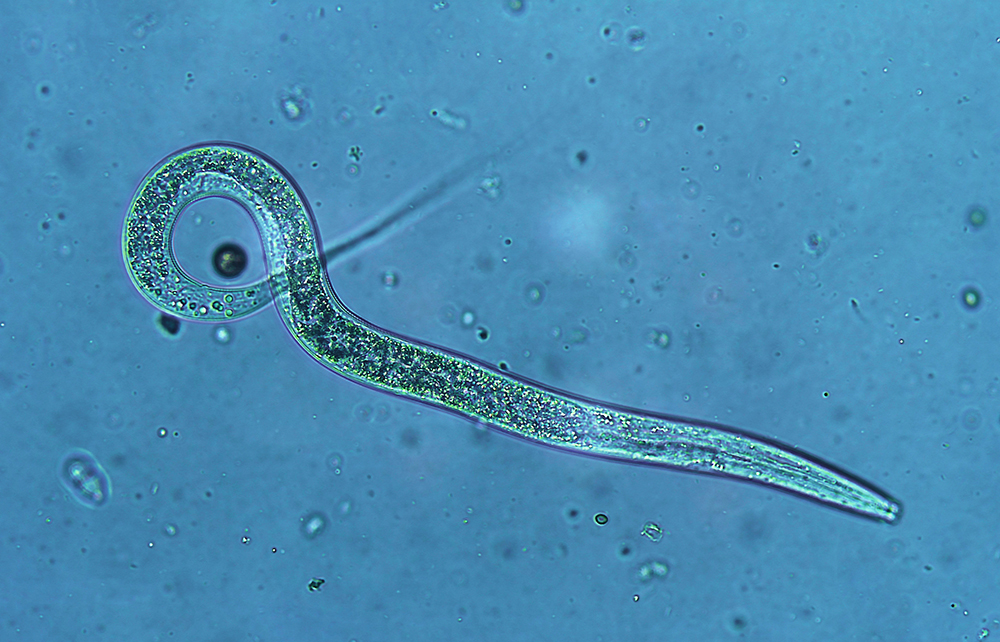In Competition No. 3313, you were invited to supply a poem about the worms that were resurrected by scientists after being frozen in the Siberian permafrost for 46,000 years.
The tiny roundworms, buried deep underground since the late Pleistocene, were brought back to life by being immersed in water and transported to Germany – in a scientist’s pocket – to see what lessons the creatures might yield for 21st-century humanity. (They were, it was discovered, able to survive extreme low temperatures by entering a dormant state called cryptobiosis.)
Their remarkable story produced a smart, lively and varied entry. A commendation to W.J. Webster’s limerick:
A Pleistocene worm from Siberia,
Dug up in the frozen interior,
Had the permafrost thawed
And its life was restored:
Have you ever heard anything eerier?
The winners below pocket £25 each.
Lifelessly, deathlessly,
Slumbering nematodes
Icebound and layered in
Pleistocene rime,
Wait for millennia
Cryptobiotically,
Dormant and motionless,
Frozen in time.
Suddenly wakened by
Microbiologists,
Warming to Holocene
Life, they defy
Settled assumptions of
Geochronology;
Aeons have passed in the
Wink of an eye.
Alex Steelsmith
From the tundra’s underbelly,
We salute you, now defrosted:
Pretty perfect vermicelli
Mammoths might have once accosted.
It was chilly, so we reasoned
Doggo was the best existence –
Quiet, see-through, rather weazened,
Now we’ll fire on all pistons.
In the gulag, keep your head down:
That’s what underpinned our schema,
Why we wriggled in, to bed down
Snug beneath the iced Kolyma.
Now we’re on a Dresden lab slab,
Six-week stint, so no more maybes –
Parthenogenesis! It’s ab-fab –
Babies, babies, babies, babies!
Bill Greenwell
A frozen cradle in the permafrost
reveals the ancient worms’ unique location;
their instinct to survive was never lost
while waiting in suspended animation.
A petri dish assists their new nativity
and soon they squirm, they eat, they reproduce,
we see, through their asexual activity,
a hundred wriggling progeny let loose.
We’ll study them for hints, how to survive
the worst extremes of climate change, we may
discover all we need to stay alive,
with luck these nematodes will show the way.
It seems the measure of our earthly term
may hang upon the habits of a worm.
Sylvia Fairley
We have arrived. We’ve made the news.
We’re sought for TV interviews.
Millennia old, long-time thought lost,
We popped up from the Permafrost.
We’re not advanced. We’re nematodes.
We do not write romantic odes.
We cannot claim a Nobel Prize.
We very rarely theorise.
Sweet music à la Liszt or Brahms?
We don’t have that, or nuclear arms,
And unlike humans in the main,
We live in glacial terrain.
We do what eelworms gotta do.
We live and die ignored by you,
Yet time and circumstance portend
That we’ll consume you in the end.
Basil Ransome-Davies
You’ve resurrected us – for what?
If this is ‘life’ we’d rather not.
Our crunchy, munchy lunch of soil
was innocent of motor oil.
When we popped up for air the smell
was leafy-fresh, not rank as Hell
and if we chose to move around
we didn’t risk a battleground.
(The woolly mammoth, true, had weight
but he was most considerate
unlike your mammoth, built of steel.
Remember, we predate the wheel.)
That world, though not quite Paradise,
was wholesome, clean and, frankly, nice,
and had so much of what you lack.
Do us a favour; put us back!
D.A. Prince
Two lowly worms for aeons were asleep
Encased in ice and given up for dead
But somehow chance permitted them to keep
Their simple life within an icy bed.
So they awoke from dark antiquity
To cast their forty thousand years aside.
Their resurrection to modernity
May offer science secrets that they hide
Of times when dinosaurs were commonplace
And giant beasts had not encountered man.
Within their bodies there may be a trace
Of matter telling how their life began.
If prehistoric worms can live again
Tomorrow we might chat with ancient men.
Frank McDonald
No. 3316: Take five
You are invited to recast Rishi Sunak’s five pledges in verse form. Please email entries of up to 16 lines to lucy@spectator.co.uk by midday on 6 September.






Comments